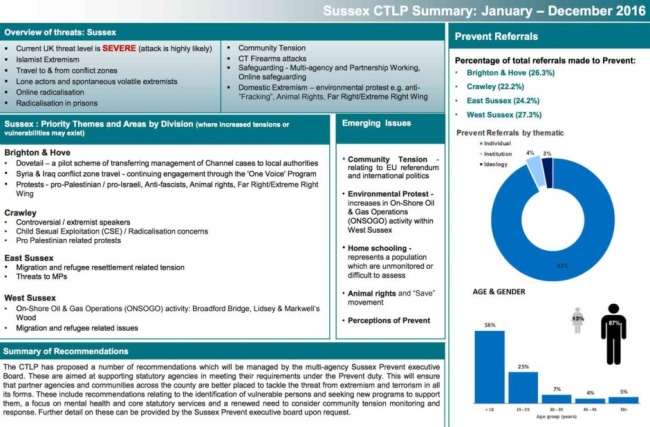South East Counter Terrorism Unit (SECTU)
The South East Counter Terrorism Unit (SECTU) includes Sussex Police, Surrey Police and Kent Police.
Contents
Record and controversies
Labelling oil and gas protestors as potential 'domestic extremists'
In 2018 an investigation by Spinwatch into the policing of the anti-fracking movement found that 'despite the Home Office’s December 2016 advice that ‘support for anti-fracking is not an indicator of vulnerability’ under the Prevent strategy, 'at least seven of the 11 regional counter terrorism units (CTUs) and counter terrorism intelligence units (CTIUs) that make up the UK’s National Counter Terrorism Policing Network have either carried out monitoring or surveillance and/or unjustifiably smeared anti-fracking campaigners [over the past five years].'Surrey, Sussex and Kent Police are all member forces of the South East Counter Terrorism Unit (SECTU).
Sussex Police was one of the first forces to associate protest against oil and gas as a public threat when it identified Celtique Energy’s Broadford Bridge exploratory drilling operation ‘as a site for potential “domestic extremism”’ in early 2013 according to council documents published by Netpol.
Then in 2014, a badly redacted FOI disclosure site exposed how the Sussex force had spied on anti-fracking protestors at Cuadrilla’s controversial Balcombe site the previous summer. As DrillorDrop noted at the time:
‘The redacted section from the findings dealt with intelligence and specifically stated that the operation used covert intelligence-gathering. “Once the operation moved into August”, the report said, “it was apparent that an appropriate range of intelligence sources were being harnessed, including where appropriate ECHR [European Court of Human Rights] compliant covert means.”’
Meanwhile neighbouring force Kent Police was forced to admit it had planted a Special Branch detective in a public fracking debate in late 2014 at Canterbury’s Christ Church University, to ‘gather information that could prevent harm being caused to those attending such a meeting or similar future events’. The force had also (unsuccessfully) demanded the names of those attending the event.
Surrey, Sussex and Kent Police are all member forces of the South East Counter Terrorism Unit (SECTU). Surrey Police’s Special Branch has had an ‘effective working relationship’ since 2013 with SECTU and surrounding forces’ to help tackle terrorism and domestic extremism risks.
Counter-Terrorism Local Profiles
A controversial role of Special Branch within SECTU is to produce the Counter Terrorism Local Profile (CTLP) for Surrey and Sussex. CLTPs were described in 2010 as an ‘intelligence product’ by Charles Farr, former head of the UK’s Office for Security and Counter-terrorism. Their purpose is to give an overview of terrorism risk, and supplement a region’s Prevent strategy.
Additionally, CTLPs can be used to ‘provide contextual information to help schools understand the risks in their areas’. As Spinwatch and Drill or Drop revealed in late 2016, some schools have even published CLTPs on their websites as part of their Prevent ‘safeguarding’ documents. More recently, we found Surrey SB's CTLP summary, dated June 2016, still available on Spelthorne School’s website in August 2018 (though no longer on its 'Safeguarding' page). Written by Special Branch’s ‘Research and Analysis’ team and signed off by the head of Surrey and Sussex Special Branch, this profile flagged ‘community tensions relating to onshore oil and gas operations’ in East Surrey as a counter terrorism ‘priority theme/ area’.
Sussex’s 2016 CTLP summary, revealed by Cage last September [2017], was likewise signed off by Sussex and Surrey’s Special Branch and links protest action against onshore oil and gas exploration with domestic extremism. It cites ‘environmental protest e.g. anti-“fracking”’ as a ‘priority’ concern and ‘emerging issue’, specifically naming oil and gas sites in Broadford Bridge, Lidsey and Markwell’s Wood in West Sussex. UKOG, whose ‘draconian and chillingly anti-democratic’ injunction against ‘persons unknown’ was extended this week, operates these sites.[1]
2016 CLTP
Resources
- Netpol, Campaigners, not extremists, 2019
Notes
- ↑ Melissa Jones and Russell Scott, Why are counter terrorism police still spying on the anti-fracking movement?, Spinwatch, 9 September 2018
